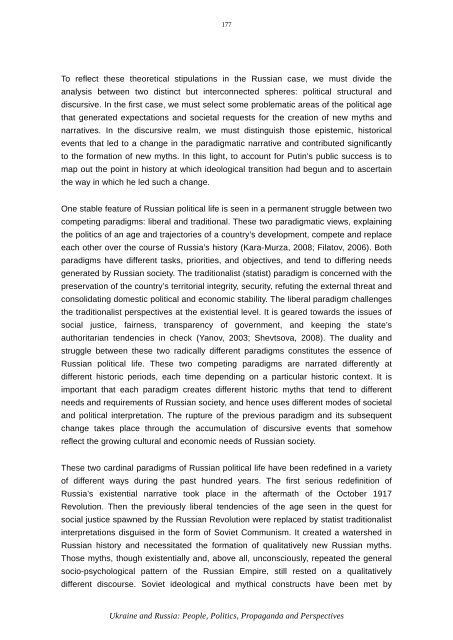Ukraine-and-Russia-E-IR
Ukraine-and-Russia-E-IR
Ukraine-and-Russia-E-IR
You also want an ePaper? Increase the reach of your titles
YUMPU automatically turns print PDFs into web optimized ePapers that Google loves.
177<br />
To reflect these theoretical stipulations in the <strong>Russia</strong>n case, we must divide the<br />
analysis between two distinct but interconnected spheres: political structural <strong>and</strong><br />
discursive. In the first case, we must select some problematic areas of the political age<br />
that generated expectations <strong>and</strong> societal requests for the creation of new myths <strong>and</strong><br />
narratives. In the discursive realm, we must distinguish those epistemic, historical<br />
events that led to a change in the paradigmatic narrative <strong>and</strong> contributed significantly<br />
to the formation of new myths. In this light, to account for Putin’s public success is to<br />
map out the point in history at which ideological transition had begun <strong>and</strong> to ascertain<br />
the way in which he led such a change.<br />
One stable feature of <strong>Russia</strong>n political life is seen in a permanent struggle between two<br />
competing paradigms: liberal <strong>and</strong> traditional. These two paradigmatic views, explaining<br />
the politics of an age <strong>and</strong> trajectories of a country’s development, compete <strong>and</strong> replace<br />
each other over the course of <strong>Russia</strong>’s history (Kara-Murza, 2008; Filatov, 2006). Both<br />
paradigms have different tasks, priorities, <strong>and</strong> objectives, <strong>and</strong> tend to differing needs<br />
generated by <strong>Russia</strong>n society. The traditionalist (statist) paradigm is concerned with the<br />
preservation of the country’s territorial integrity, security, refuting the external threat <strong>and</strong><br />
consolidating domestic political <strong>and</strong> economic stability. The liberal paradigm challenges<br />
the traditionalist perspectives at the existential level. It is geared towards the issues of<br />
social justice, fairness, transparency of government, <strong>and</strong> keeping the state’s<br />
authoritarian tendencies in check (Yanov, 2003; Shevtsova, 2008). The duality <strong>and</strong><br />
struggle between these two radically different paradigms constitutes the essence of<br />
<strong>Russia</strong>n political life. These two competing paradigms are narrated differently at<br />
different historic periods, each time depending on a particular historic context. It is<br />
important that each paradigm creates different historic myths that tend to different<br />
needs <strong>and</strong> requirements of <strong>Russia</strong>n society, <strong>and</strong> hence uses different modes of societal<br />
<strong>and</strong> political interpretation. The rupture of the previous paradigm <strong>and</strong> its subsequent<br />
change takes place through the accumulation of discursive events that somehow<br />
reflect the growing cultural <strong>and</strong> economic needs of <strong>Russia</strong>n society.<br />
These two cardinal paradigms of <strong>Russia</strong>n political life have been redefined in a variety<br />
of different ways during the past hundred years. The first serious redefinition of<br />
<strong>Russia</strong>’s existential narrative took place in the aftermath of the October 1917<br />
Revolution. Then the previously liberal tendencies of the age seen in the quest for<br />
social justice spawned by the <strong>Russia</strong>n Revolution were replaced by statist traditionalist<br />
interpretations disguised in the form of Soviet Communism. It created a watershed in<br />
<strong>Russia</strong>n history <strong>and</strong> necessitated the formation of qualitatively new <strong>Russia</strong>n myths.<br />
Those myths, though existentially <strong>and</strong>, above all, unconsciously, repeated the general<br />
socio-psychological pattern of the <strong>Russia</strong>n Empire, still rested on a qualitatively<br />
different discourse. Soviet ideological <strong>and</strong> mythical constructs have been met by<br />
<strong>Ukraine</strong> <strong>and</strong> <strong>Russia</strong>: People, Politics, Propag<strong>and</strong>a <strong>and</strong> Perspectives


